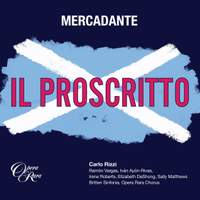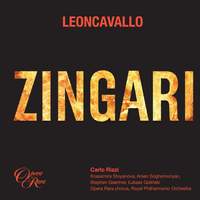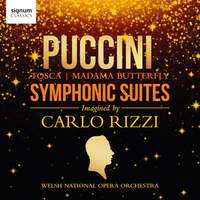Interview,
Carlo Rizzi on Mercadante, Leoncavallo and Donizetti

With the benefit of hindsight, the autumn of 2019 wasn't exactly the most auspicious time to take the helm of a company devoted to performing and recording forgotten operas - shortly after the Italian conductor Carlo Rizzi succeeded Sir Mark Elder as Artistic Director of Opera Rara, he found himself confined to his home-office in Wales for months rather than bringing Leoncavallo's sizzling one-act opera Zingari to the stage and studio as planned...
But as I discovered when I caught up with Carlo earlier this year, he made a virtue of necessity during those long, quiet months - diving head-first into the music of Saverio Mercadante via online archives, sowing the seeds for an eight-album Donizetti song-project with his friend Roger Parker, and compiling symphonic suites on two popular Puccini operas. With Zingari and Mercadante's 'Scottish' opera Il Proscritto now performed, recorded and released, we spoke at length about the special qualities of both scores as well as looking ahead to what 2024 has in store from him on the recording front...
Zingari was enormously successful during Leoncavallo's lifetime - why did its popularity seemingly die with its composer?
It’s a very strange thing. Zingari is still the second-most-performed opera by Leoncavallo – more than Zazà, more than Bohème - so it must’ve had a really good run right after it was composed! It was written in an era when demand for new operas was sky-high, which meant that things got eclipsed very quickly. Whenever I’m discussing my work with Opera Rara, people often ask me how things fall out of the repertoire and I always make this parallel: I’m not a great connoisseur of pop music, but when I was a child I remember that each year there was the ‘Canzone d’estate’ (the ‘Song of Summer’). You were hammered with it for the entire holiday-period, and the next year it was gone! Does that mean that each song wasn’t good? No, it was just that other things came along!
Zingari is a very fine opera – and I’m not just saying that because we recorded it, but because of the reception from critics and audiences. It’s very well-constructed and full of great melodies; OK, the libretto is a little bit silly, but that’s true of about 98% of operas! Some people have said that Zingari is a sort of photocopy of Pagliacci, and there’s some truth in that in terms of the form. Both are one-act operas in two parts, divided by an intermezzo; both operas feature the chorus heavily in both parts; both operas involve a love-triangle (but again that’s true of nearly every opera!).
But it’s fascinating to see how Leoncavallo revisits this idea of verismo twenty years after he’d first used it in Pagliacci. Certain naiveties that you find in the orchestration of Pagliacci are not present in Zingari: obviously the orchestra still has a very important role, but it’s much more streamlined.
What are the highlights of the score for you?
The fascinating thing about Zingari for me is that the roles are so different from Pagliacci. I would particularly like to focus on the role of Fleana, who is the polar opposite of Nedda in Pagliacci. Nedda is a dreamer who’s trapped in a bad situation: she doesn’t manage to escape with Silvio, everything goes wrong and she dies. Fleana is a completely different character: she doesn’t give, she takes. Although she still ends up dead, her agency is a big part of what makes the piece interesting.
I think if somebody wanted to try something from Zingari, I would suggest the two wonderful love-duets, which speak of completely different kinds of love. In the first one Fleana is just a young girl who dreams of falling in love and obtains her father’s permission to marry the outsider, Prince Radu; in the second one she’s become bored of Radu and goes back to her childhood sweetheart Tamar, the poet of the Zingari. The love is more mature, and you can hear that in the music.
Your next project with Opera Rara was Il Proscritto by Saverio Mercadante - a composer who didn't produce a big hit like Pagliacci for listeners to use as a reference-point! What set you on his trail?
During the pandemic I was thinking about future opera projects and I wanted to find something that’s never been performed in modern times. I focused on Mercadante because he’s in the fifth column of the fourth grade of composers: he’s actually really good, but had a lot less fame and success than Donizetti, Rossini or Bellini. I found Il Proscritto online: thankfully a lot of things are digitalised these days, so rather than having to channel Indiana Jones and battling metaphorical rattlesnakes in some conservatory in Italy, I can do a lot from my studio in Penarth!
It’s still a very slow and slightly painful process: when you open these manuscripts on your iPad your eyes go crossways because they’re really difficult to read, and there’s no information about the plot or even the music. I always start from the point of view that if I get bored, then the public probably will as well - and when I came to Il Proscritto I wasn’t bored! It opens with this very beautiful short tenor aria, then this great celebratory chorus with the banda and I just kept reading…
Again, the plot itself is quite far-fetched - there’s this silly business where one husband was thought to be dead and his wife’s just got married to someone else - but then many things are striking, not least the very short final act. There’s one scene where the heroine Malvina is torn between being faithful to the first husband and her love for the second, and she decides that the best thing for her to do is to disappear, to die.
She goes out and takes poison, and the two guys are fighting over her - then she comes back and says ‘Actually, you’re fighting over a corpse’! The opera finishes without a chorus, which is quite radical in itself: instead, you have this very intimate, poignant trio. The very last phrase of the opera is pretty melodramatic, though: it ends with the original husband pronouncing ‘Dead or alive, she’s still mine!’.
Unlike Zingari, Il Proscritto met with a pretty lukewarm reception at its premiere...It's quite a transitional work in some respects, with some elements seeming to point forward towards Verdi - how much do you think Mercadante suffered from being slightly ahead of his time?
There are so many things going for this opera: a beautiful chorus in the second act, an incredible aria for the lower mezzo, interesting orchestration, and a very particular way of writing vocally. Some elements are quite unusual: the two husbands are both tenors (not the usual thing where two suitors are baritone and tenor), and instead of a main role for soprano we have two mezzos! So we have something very rare here: an opera which includes duets for two tenors and for two mezzos. I remember Irene and Elizabeth saying during rehearsals that they’d never, ever sung a duet with another mezzo!
Maybe that was part of the reason why the opera wasn’t a great success: perhaps people wanted to see a soprano who dies and a tenor who throws out top Cs whilst fighting the baritone…and none of this happens. And the orchestration is quite elaborate: to our modern ears that’s great, but maybe it was too much for the people of the time. Our musicologist Roger Parker found various contemporary reviews arguing that the first act was a great success but then Mercadante gives too much importance to the orchestra…
I get the feeling that Mercadante had a little bit of a chip on his shoulder because he wasn’t as well received as Donizetti or Bellini or Verdi, and maybe he was trying just a bit too hard with the orchestration…Let’s not forget that Mercadante became the director of the Conservatory of Napoli, and I think always retained this rather didactic, scholarly approach to music.
Allow me to spill some (very small!) beans here: I actually cut out eight bars which just sounded superfluous to me, even though you could see why he’d done it in terms of constructing a ‘correct’ harmonic succession. I think his main weakness was a tendency to overthink things: make it work for the listener, and if there are a few harmonic mistakes then who cares?!
What are the challenges involved in casting rarities like Zingari and Il Proscritto?
The good thing is that we can handpick the singers. For a project like Il Proscritto where we needed two tenors and two mezzos, you can’t just pick them off the shelf – you need to consider the relationship between the two voices. In the end we got what we wanted, but it’s definitely one of the most interesting, rewarding and difficult tasks of working with Opera Rara.
It’s a lot to ask of a singer to prepare a role from scratch for a single performance and recording, but once we find people who will commit then it’s wonderful because everybody’s completely immersed. I love our first piano-rehearsals: it feels exactly like when the composer himself was getting together with the singers for the first time.
The other great thing about working on these rediscovered operas is that the singers don’t come with a preconceived idea of what to do - and my job in turn is to be very open-minded and elastic in what I suggest to them, because what I have in my mind maybe doesn’t fit their kind of voice. If you’ll forgive me another parallel, if you’re a driver you’re not going to drive a car that has a really powerful engine like you would a car that’s lighter and speedier: you adapt your way of driving to what you have and that’s exactly what an opera-conductor needs to do as well.
I gather you're switching hats for the next Opera Rara project, which will see you moving from podium to piano-stool for the complete Donizetti songs...
This came about after a conversation I had with Roger Parker during the pandemic: I got to know Roger when I conducted a concert performance of Donizetti's Elisabetta from his new edition at the Royal Opera House in 1997, so we go back a long way! He mentioned that Donizetti wrote a huge number of songs and duets, half of which have never been recorded, published or even performed, and I thought that would be a fantastic project for Opera Rara.
The songs are either in Italian or French (probably from when Donizetti was in Paris), and there’s a real mix: some are just simple melodies but others are more complex, with various obbligato instruments. We have a fantastic line-up of singers assembled, but the real work has been figuring out how to assign the songs: quite a few are written in bass clef but sit squarely in the tenor range, and of course the dividing-line between soprano and mezzo was far less clear in Donizetti’s age than it is today…It’s a question of looking carefully at the mood and character of the song and making an informed decision.
Another lockdown-project of yours is about to see the light of day at last: namely some early Puccini orchestral works and your own symphonic suites on Madama Butterfly and Tosca. What inspired you to turn your hand to these, and how much musical archaeology was involved?
The idea came to me when I was conducting the suite from Der Rosenkavalier and started wondering whether it would be possible to do something similar with an Italian opera…It wouldn’t work with Bellini, Donizetti or even Verdi, because so much is accompaniment with the voice on top - but Puccini is different because so much of the drama is right there in the orchestra. I wanted to put this together to show that Puccini is a great orchestrator and composer full-stop, not just a great opera-composer.
This isn’t an Opera Rara project, but in the spirit of Opera Rara I’m going to also record an early work, the Preludio Sinfonico: it’s the last work that Puccini wrote as a composition student at Milan Conservatory, and it’s only rarely recorded. I found a set of the original parts written by Puccini as a student (he was his own copyist at that stage!), and I noticed that there is a big cut in the middle which got my antenna working…Puccini had glued new music over what he’d originally written, and you can just about make out his first draft from where the ink that has spilled through - I don’t think I've captured 100% of what he wrote but it’s pretty much there, and that’s the version I’m going to record.
When I was looking at the music that he cut I thought ‘Hang on, I recognise this…!’. I mentioned it to Roger and he sent me an article which mentioned that Puccini had used that cut material later on, in Le Willis and then in Edgar! Clearly this music was sitting in his head: it’s not that it was bad music which he just discarded. So in the recording there’s a little bit of Opera Rara, and the rest is Rizzi/Puccini – or rather Puccini/Rizzi!
Ramón Vargas (Giorgio Argyll), Irene Roberts (Malvina Douglas), Elizabeth DeShong (Odoardo Douglas), Sally Matthews (Anna Ruthven), Iván Ayón-Rivas (Arturo Murray), Goderdzi Janelidze (Guglielmo Ruthven)
Britten Sinfonia, Opera Rara Chorus, Carlo Rizzi
Available Formats: 2 CDs, MP3, FLAC, Hi-Res FLAC
Krassimira Stoyanova (Fleana), Arsen Soghomonyan (Radu), Stephen Gaertner (Tamar), Lukasz Golinski (The Old Man)
Royal Philharmonic Orchestra, Opera Rara Chorus, Carlo Rizzi
Available Formats: CD, MP3, FLAC, Hi-Res FLAC
Puccini: Symphonic Suites on Tosca & Madama Butterfly
imagined by Carlo Rizzi; Welsh National Opera Orchestra, Carlo Rizzi
Due for release on 9th February 2024.
Available Formats: CD, MP3, FLAC, Hi-Res FLAC





